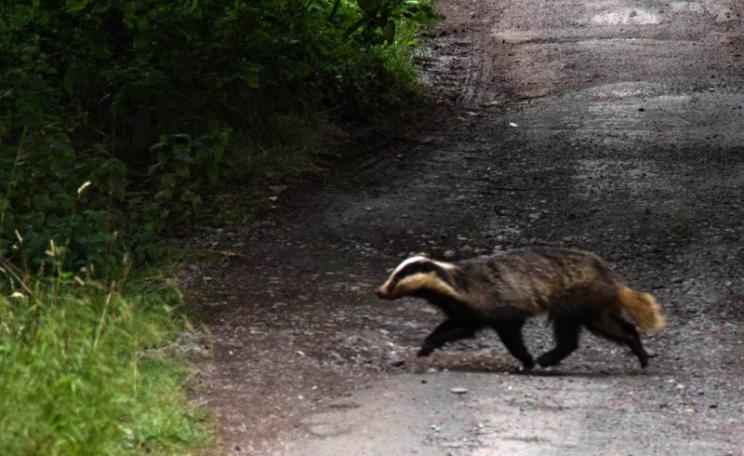Hound-to-cattle bTB transmission, perhaps via hound excrement left in fields pastured by cattle, is entirely plausible. Hound excrement may even be infecting badgers with bTB.
The news finally broke cover a few days ago, news which the Kimblewick Hunt had been sitting on since December.
The Kimblewick is an amalgamation of three former hunts, and hunts over land in six counties, Bedfordshire, Berkshire, Buckinghamshire, Hampshire, Hertfordshire and Oxfordshire.
Rather than the familiar red coats, it wears coats of a peculiar mustard yellow. None of this has made it newsworthy.
But the fact that 25 of its foxhounds had to be put down because they were infected with bovine TB, with a further 120 undergoing testing, has made both wildlife organisations and farmers sit up. Information given to Hounds Off claimed that at least 40 hounds had been culled.
Horse & Hound were full of praise of the Hunt's action in suspending hunting, only to add that hunting was carrying on anyway, using 'visiting packs'. And of course the Hunt was cooperating fully with Defra, vets and everyone else to find the source of the problem.
H&H added, for readers' comfort, that the hounds had been 'humanely put down'. The Huffington Post used the word 'euthanised'. Sorry, folks. That means they were shot, as per usual, by the kennelman or huntsman.
The same problem could be lurking in hunts across the British Isles.
The League Against Cruel Sports, which gives an account of just how the bTB outbreak was made public through the work of Hounds Off, is demanding that all hunting should stop until the problem has been fully investigated.
Defra says that bTB in dogs is not a notifiable disease, but an outbreak of this size in dogs that work across farmland must surely now be taken seriously. Just how many other packs are infected?
And of course hound-to-cattle bTB transmission, perhaps via hound excrement left in fields pastured by cattle, is entirely plausible - a fact that concerned farmers are waking up to. Hound excrement may even be infecting badgers with bTB.
Some farmers, belatedly trying to protect their cattle, have banned hunts from their land. Those local to the hunt kennels are refusing to let the hunt exercise the hounds on their land.
And campaigners fighting to stop the badger culls are wondering how the government's failure to deal with TB in the cattle through stricter cattle-based measures will spread the problem even more. Some of course also wonder if the foxhound debacle will also be blamed on the badger.
Hound-to-cattle bTB transmission, perhaps via hound excrement left in fields pastured by cattle, is entirely plausible. Hound excrement may even be infecting badgers with bTB.
So we must ask: why should such a major outbreak of bTB occur in foxhounds?
The hounds fed TB-infected 'fallen cattle' meat
The answer is simple. The hounds have been fed raw, TB-infected meat. Although this would be a contravention of meat hygiene rules and bTB controls, rules have never bothered either the hunts or farmers.
For years hunts have removed 'fallen cattle' from farms, a favour that works both ways - hunts get meat to feed their hounds and farmers get rid of unwanted carcasses. During the 2001-02 foot and mouth epidemic, the government broke its own rules by paying hunts to slaughter cattle and remove the carcasses because their own staff could not cope.
The fact that such cattle fed to hounds may have 'fallen' due to disease will be is ignored. Or perhaps not. It would make sense to many farmers that, if they suspect one of their beasts is infected with bTB, they should get it slaughtered and removed before it is tested positive and Defra puts the farm under restrictions.
You would think the farmer would rather have a disease-free herd. But more than one has been prosecuted for swapping ear tags (an individual identification tag that all cattle must have), allowing a poor but disease-free cow go to slaughter rather than the good milker which also happens to have bTB.
It should not come as a surprise that the hounds are open to this disease. A 2010 Republic of Ireland study into the diseases of hounds and the reasons why they are culled, found bTB in some of the hounds they autopsied, along with a lot of other painful conditions. Being a foxhound is not a comfortable life.
Will Defra take real action?
Two or three years ago the Northern Ireland hunt saboteurs managed to film the kennelman of the North Downs Hunt butchering cattle carcasses that had come from local farms. Government officials apparently issued a warning at the time, and the sabs thought that there had been previous warnings, due to the risk of spreading bTB.
If NI government officials recognise the risk, why are they not cracking down on it? And will Defra follow suit?
While packs of hounds exist, whether they are being used illegally by fox hunts or legally by drag hunts, the hunts will seek supplies of free meat for their hounds. And sadly, pro-hunt farmers will go on offering it, regardless of what disease they might be passing on.
Lesley Docksey is a freelance writer who writes for The Ecologist and other media on the badger cull and other environmental topics; and on political issues for UK and international websites.
Also on The Ecologist today: 'Official cover-up - are hunting hounds the 'cryptic carrier' for bovine TB?' by Jordi Casamitjana / League Against Cruel Sports.
Will you join the badger patrols this year? Why not contact your local badger group and find out if they run training days. Many badger patrol groups have their own pages on Facebook.







